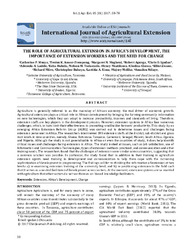| dc.contributor.author | Msuya, Catherine P | |
| dc.contributor.author | Annor-Frempong, Festus K | |
| dc.contributor.author | Magheni, Margaret N | |
| dc.contributor.author | Agunga, Robert | |
| dc.contributor.author | Igodan, Chris | |
| dc.contributor.author | Ladele, Ademola A | |
| dc.contributor.author | Huhela, Keba | |
| dc.contributor.author | Tselaesele, Nelson M | |
| dc.date.accessioned | 2020-10-22T08:59:44Z | |
| dc.date.accessioned | 2021-03-15T09:37:49Z | |
| dc.date.available | 2020-10-22T08:59:44Z | |
| dc.date.available | 2021-03-15T09:37:49Z | |
| dc.date.issued | 2017 | |
| dc.identifier.citation | Msuya, C. P., Annor-Frempong, F. K., Magheni, M. N., Agunga, R., Igodan, C., Ladele, A. A., ... & Zwane, E. (2017). The role of agricultural extension in Africa’s development, the importance of extension workers and the need for change. International Journal of Agricultural Extension, 5(1), 51-58. | en_US |
| dc.identifier.uri | https://journals.esciencepress.net/index.php/IJAE/article/view/2101 | |
| dc.identifier.uri | http://moodle.buan.ac.bw:80/handle/123456789/292 | |
| dc.description.abstract | Agriculture is generally referred to as the mainstay of African economy, the real driver of economic growth. Agricultural extension plays a critical role in African development by bringing the farming community information on new technologies, which they can adopt to increase productivity, incomes and standards of living. Therefore, extension staffs are key players in the development process. However, extension systems in Africa face numerous challenges, which, in turn limit their effectiveness in promoting smallholder farmers’ productivity. This study by an emerging Africa Extension Reform Group (AERG) was carried out to determine issues and challenges facing extension personnel in Africa. The researchers interviewed 393 extension staffs at the district, sub-district and grass root levels in nine countries, namely, Ghana, Botswana, Tanzania, Cameroon, Senegal, Malawi, South Africa, Uganda, and Nigeria. Although the study is not generalizable to Africa or even the countries of study, it does help identify critical issues and challenges facing extension in Africa. The study looked at issues, such as job satisfaction; use of Information and Communication Technologies, types of extension methods practiced; and communication and other training needs. The researchers found that the challenges of extension were similar across countries, suggesting that a common solution was possible. In particular, the study found that in addition to their training in agriculture extension agents need training in development and communication to help them cope with the increasing sophistication of development in programming. The findings call for re-thinking the reformation of extension at two levels: a) re-examining extension training at the university level; and b) re-positioning extension in the field such that it serves as a neutral facilitator of development across sectors. At the moment, extension systems are so married with agriculture that other sectors do not see them as un-biased knowledge facilitators. | en_US |
| dc.language.iso | en | en_US |
| dc.publisher | EScience Pressesciencepress.net | en_US |
| dc.relation.ispartofseries | Int. J. Agr. Ext.;Vol. 05(01) 2017 | |
| dc.subject | Extension | en_US |
| dc.subject | Africa’s Development | en_US |
| dc.subject | Change | en_US |
| dc.title | The role of agricultural extension in Africa’s development, the importance of extension workers and the need for change | en_US |
| dc.type | Article | en_US |

